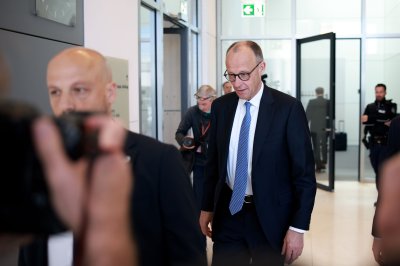
1 of 2 | CDU leader Friedrich Merz leaves a parliamentary group meeting at the Bundestag in Berlin on Tuesday after failing in his bid to be elected chancellor in the first round of ballot of MPs. Merz later was elected Tuesday as chancellor in a second vote. File Photo by Clemens Bilan/EPA-EFE
May 6 (UPI) — Center-right politician Friedrich Merz was elected as German chancellor Tuesday in a second vote just hours after his historic defeat in a bid to lead the country.
“I accept my election as Chancellor of the Federal Republic of Germany with gratitude and respect for the task,” the newly elected Merz posted on X, saying he will approach the work ahead with “courage and confidence.”
The leader of Germany’s center-right Christian Democrat-Social Democratic coalition, Merz suffered an initial shock defeat during the day in his bid to become Germany’s 10th chancellor after he failed to secure a majority vote in the Bundestag, the German parliament, in Berlin.
But in Tuesday’s second vote after a series of political machinations, Merz received 325 votes — 9 more than required — with 289 against, one abstention and three invalid votes.
“Because we are a strong country — and our country can do more!” he added in the afternoon on social media after the secret ballot vote.
On Tuesday, Merz stated that he wanted to send a message that “Germany is back” as he was sworn in and met with German President Frank-Walter Steinmeier and reconfirmed this week’s travel itinerary.
“We sincerely hope that Germany will become even stronger and that we will see even more German leadership in European and [trans-Atlantic] affairs,” Ukrainian President Volodymyr Zelensky posted on X in a congratulatory note to Merz.
“This is especially important now, when the future of Europe is at stake, and it will depend on our unity,” said Zelensky, adding how Germany has “saved thousands and thousands of Ukrainian lives” since Russia began its deadly three-year-long war with its much smaller neighbor.
Merz, whose election had been expected to be formality a day after the two centrist parties formally entered into a coalition, first won 310 votes — six short of the 316 he needed to be chancellor in the wake of a snap national election in February in which no party secured an overall majority.
“After the coalition agreement between CDU, CSU and SPD was signed yesterday, Friedrich Merz is officially elected federal chancellor today,” the CDU declared on X early Tuesday, only to walk it back hours later.
It marked the first time any leader had fallen short in the first round in more than seven decades and likely will hinder Merz’ ambition to draw a line under the perceived failures of the previous government of Olaf Scholz, which was the country’s last majority government toppled in December by a no-confidence vote.
Merz, a conservative, has called for stricter border control measures and was widely looked at to be Germany’s next chanceller after snap elections in February.
In March, he unveiled his party’s plan to boost defense spending by hundreds of billions of dollars by 2030 by relaxing strict so-called “debt brake” rules in part due to recent moves by the United States.
“I wish (Merz) strength and continued determination — both in leading Germany through important transformations and in supporting Ukraine,” Vitaliy Klychko, the mayor of Kyiv and leader of Ukraine’s UDAR party, added on social media.
The CDU and SDP have a comfortable margin with 328 seats out of 630 between them but Merz was derailed in the first round vote after 18 MPs who were expected to back him, decided otherwise.
SDP co-leader, Lars Klingbeil, who was to be vice chancellor in the new coalition government, denied SDP MPs were behind Merz’ defeat, with the implication that Merz faced a revolt within the ranks of his own party.
Bundestag rules permit other candidates to run for chancellor and there is no restriction on how many times a vote can be repeated, subject to a 14-day time limit after which a leader can be elected with a simple majority.
The Elon Musk-backed AfD, designated days ago as an “extremist” group by German intelligent officials, called for a general election.
Its joint leader Alice Weidel wrote in post on X that the debacle demonstrated “the weak foundation on which the small coalition between the CDU/CSU and the SPD, which was voted out by the voters, is built.”